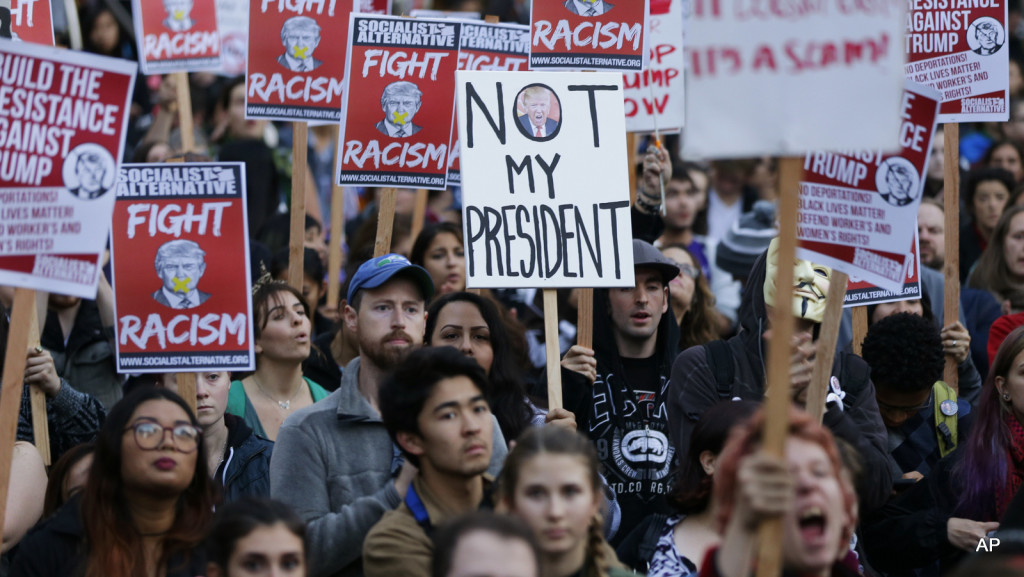Open Letter to Graduate Students in Psychology:

Protesters hold signs during a protest against the election of President-elect Donald Trump, Wednesday, Nov. 9, 2016, in downtown Seattle. (AP Photo/Ted S. Warren)
On November 9, 2016, we woke up to a new era in modern American politics. Not since the presidential campaign of pro-segregation proponent George Wallace in 1968 have racial and ethnic intolerance been expressed so openly and vehemently by a presidential candidate. Donald Trump called Mexican immigrants “rapists” and “drug dealers,” questioned the impartiality of federal judge Gonzalo Curiel due to his Mexican ancestry, and called for a ban on Muslims entering the United States. He also proclaimed that African-Americans and Latinos are “living in hell,” reinforcing negative stereotypes and ignoring the vibrancy that exists in both communities. Indeed, Donald Trump has a long history of racist remarks and attitudes. Trump also repeatedly made misogynistic statements that denigrated and demeaned women, and was caught boasting about sexual assault. Despite these infractions, Donald Trump became the President-Elect of the United States.
The work of activists is needed now more than ever. As is evident from the recent wave of hate crimes across the United States, bigots are emboldened as a result of Trump’s victory, and Black and Brown lives are at great risk. The APA Ethics Code calls on us to promote the welfare and protection of the individuals and groups with whom psychologists work. The code also calls on psychologists to “respect and protect the civil and human rights” of our clients. When the welfare of our clients is jeopardized by racial discrimination, we are called to stand up and seek justice on their behalf.
With this in mind, we are calling for a national dialogue titled “#NotMyPresident – Anti-Racism Activism Under a Trump Presidency,” to take place at 5:00 p.m. CST on January 17, 2017.
The goal of this dialogue is to discuss the impact of a Trump presidency on the mental health of Black and Brown people, as well as strategies we can take to combat intolerance under Trump. We will also discuss how to stay engaged with those with whom we disagree in a way that honors our core values, and their humanity.
We call on fellow students to take up the torch and organize this dialogue on their respective campuses. We ask that student leaders spread the word throughout their programs so that we can make a powerful statement of our values and vision for the future. Also, please share this letter on social media and email your friends and colleagues to help get the word out.
We have created a Facebook event page to help coordinate our activities.
Your Fellow Students,
#psychologists4blacklives
#ψ4BL
#P4BL
Facebook: https://www.facebook.com/PsychologistsforBlackLives/
Twitter: https://twitter.com/psi4bl
Editor’s Note: APAGS values the diverse voices and opinions of our guest editors. The views expressed in this post are those of the author and do not necessarily represent the views of APAGS or the APA.
